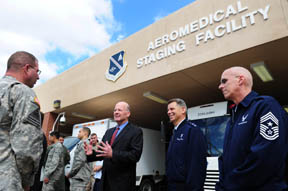CONCORD, N.H.: Each of New Hampshire’s 10 community mental health centers will have a staff member devoted to helping veterans, military service members and their families connect with other community resources under a first-of-its-kind initiative being launched by the state’s Department of Health and Human Services.
Commissioner Nick Toumpas was joined by state military officials, the directors of VA health centers in New Hampshire and Vermont, and numerous civilian sector partners to describe several initiatives aimed at improving health care and other services for veterans, active military and their families.
He said the federal Substance Abuse and Mental Health Services Administration recently confirmed that no other state has created military liaison positions within its entire community mental health system.
“We’re improving access to care and creating new access points, and we’re doing this together with all of you,” Toumpas said. “It’s an exciting time for the state, and it’s really an opportunity for all of us.”
In addition to serving as a point person to direct patients to available resources, each liaison will also take the lead in educating others in the health centers about military culture, said Suellen Griffin, chairwoman of the New Hampshire Community Behavioral Health System.
“We don’t want this to be sort of a sleeping dog, where only one person in the agency knows about it, but rather they keep it alive and well and talk about it, and make sure our folks are confident in being able to treat our veterans that may present themselves to us,” she said.
The mental health centers also are part of a second initiative being formally launched called “Ask the Question.” The program, being run by Easter Seals NH, is a statewide campaign to encourage health care providers, social service organizations and others to ask patients and clients if they had served in the military.
“We don’t know who we serve. We’ve never been able to get our hands on it, it’s like sand through your fingers,” Griffin said.
The state is contracting with a Portsmouth-based group called Dare Mighty Things for a third new program to will train health care providers and others in military culture to ensure that providers understand veterans and know where to refer them.
Navy veteran Nick Tolentino said having health care providers who asked him about his service before a recent surgery made a big difference in helping him avoid a bad experience in the recovery room. Instead of a violent wake up like he had experienced after a military surgery, he worked with a fellow veteran and staffer at Exeter Hospital to ensure a calm experience, he said.
But Tolentino said he hasn’t always disclosed his military service to health care providers for main reason: the stigma. He said he feels shame about what he has seen and done, and guilt over surviving when friends were killed.
“You’re always fighting the stigma,” he said. “You were fighting it over there. You’re fighting it when you come home.”
New Hampshire has the fifth-highest ratio of veterans in the United States, with 115,000 veterans making up nearly 11 percent of the state’s population. But the state does not have an active duty military installation where veterans can easily find support and services, and it is one of a few states without a full-service VA hospital. The VA medical center in Manchester, however, collaborates with its counterpart in White River Junction, Vermont, and the directors of both praised the new programs as further examples of how government, military and civilian groups have worked well together. -AP







